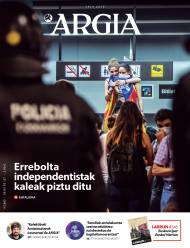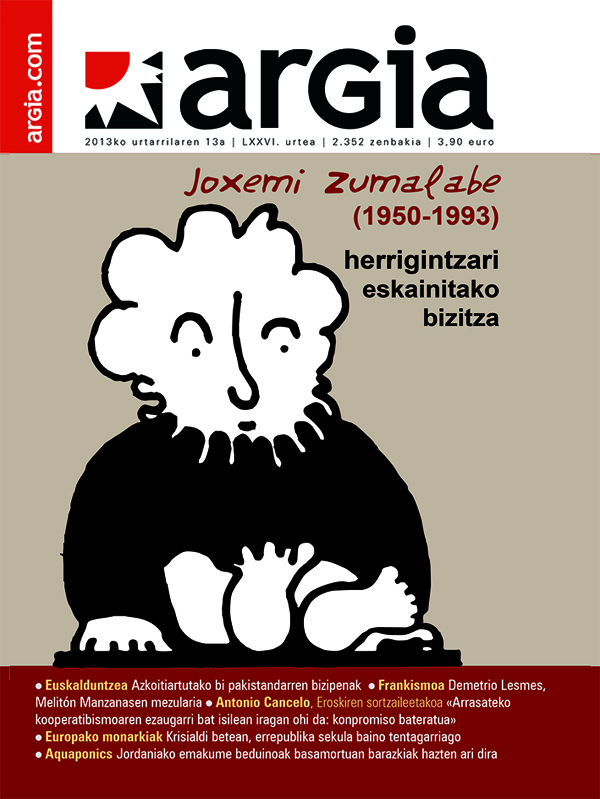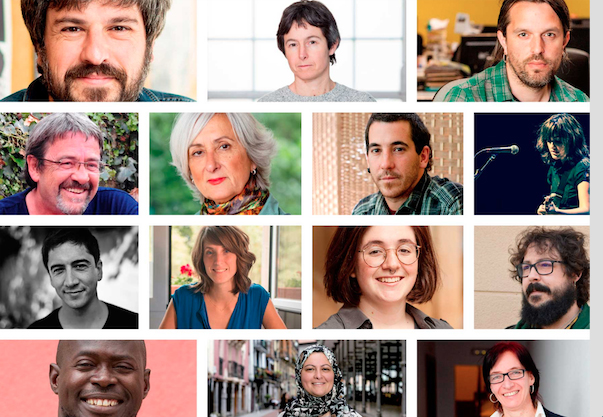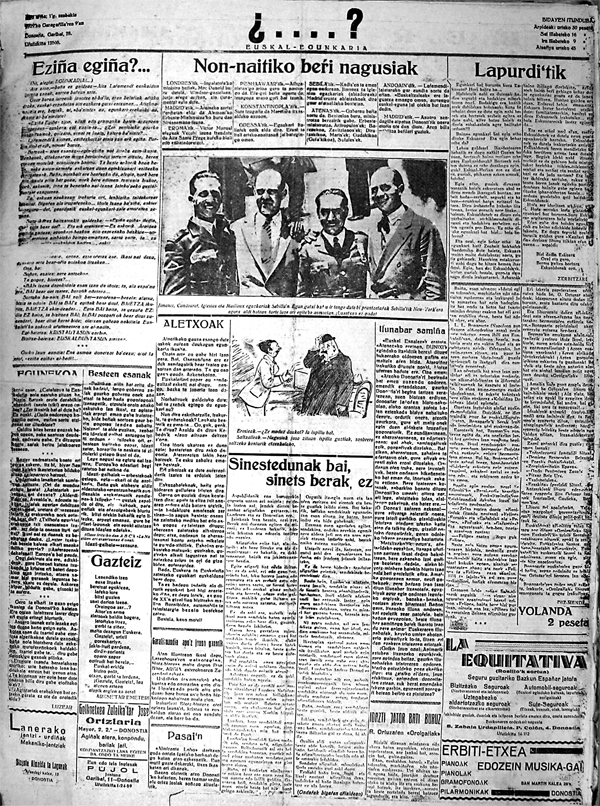"The collective functioning has kept the LIGHT"
- On the centenary of ARGIA, we wanted to do something very important to explain this project. In order for the following to understand what the capitalist economy cannot explain: how a project has lasted in Basque which is of workers for so many years. Gorka Bereziartua has written the red book of ARGIA and ARGIA People have picked us up at home next to this weekly. The people we read and like can use and disseminate their content among friends and friends, at work and in activism.

We are not neutral is the title of the book we have just published on the occasion of the centenary of ARGIA. But contrary to what you could expect, it's not a history book. Why?
At first we did intend to make a history book and put it to an ARGIA collaborator, but when we met to talk about it, listening to the views of very important ARGIA people, we came to the conclusion that maybe that wasn't the kind of book we had to do right now. We all know how many turbulence has occurred in Euskal Herria between 1919 and 2019 and how many fractures. The history of Argia has not been a continuous line either, it has suffered many interruptions and, at times, it has also suffered fractures. In order to give a complete and coherent explanation of this, we had to make impossible balances, so we directly set aside this purpose.
"It's a hybrid book. If the historical topic has that point of chronicle. But I've had to touch my attempt to explain our working philosophy at ARGIA."
Once he left that project aside, I was commissioned to make a book about ARGIA taking advantage of the centenary, but as usual in this house, giving me total freedom over the content of that book. And what have we grabbed? Well, to the key moments to explain the current LIGHT. So there's a bit of history, but above all, the book explains our philosophy of functioning. We had to put a starting point in history, and we set the year 1980 as a starting point.
What has the writing process been like?
Pretty complicated. It's a hybrid book. If the historical topic has that point of chronicle. But I've had to give it a touch of attention to explain our philosophy of working at ARGIA. Many of the opinions given in the book are mine, but I wanted the team to be reflected and we did some sessions, especially at the drafting meetings, to contrast ideas. It's a kind of Frankenstein.
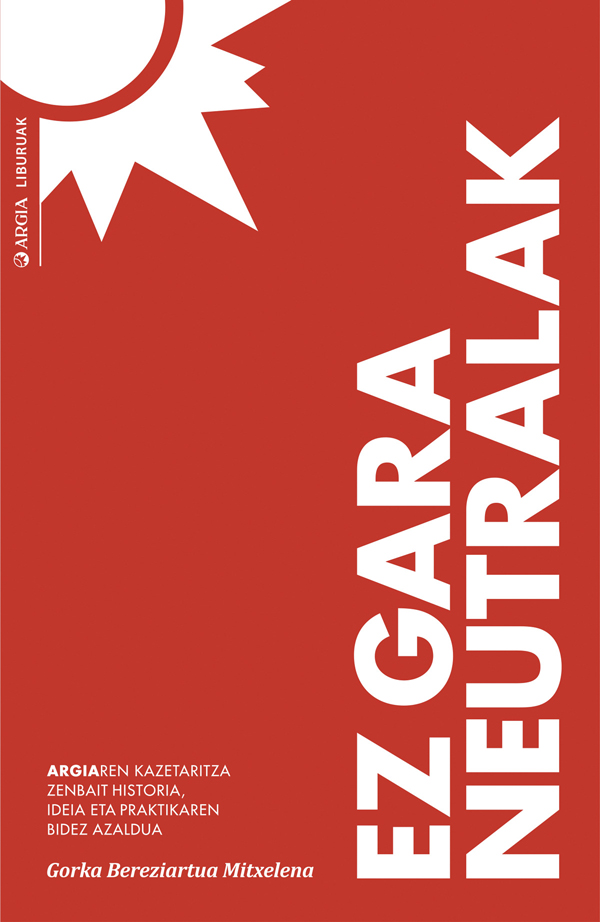
The LIGHT of the 1980s is the basis for reflection. Why?
"In the 1980s, a risky wager was placed on those who decided to continue in ARGIA, because the mainstream said that making the press only in Basque had no future."
Because in 1980 there was an important change, starting with the name: until then it was the Celestial Light and then it lost the Sky. At that time it went from the hands of the Capuchin friars to the hands of the workers and to work with the philosophy of cooperatives. I think this change has to do with the spirit of the time: Zeruko Argia During the 1960s and 1970s, the voice of the Basque progressive and anti-francoist became more and more. But in the late 1970s, some political parties that articulated this social group opted for a bilingual press and a diglosic of clarity. Thus, in the 1980s a risky wager was placed on those who decided to continue in ARGIA, as the mainstream said that making the press in Basque had no future. Thanks to the courage that this group had throughout the 1980s it has been shown to be possible, and also many see the future in the media entirely in Basque.
What did those Argieros of the 1980s bring?
This group saw at that time that the bilingual diglosic press did not fulfill the obligations of a people who want to live in Euskera, since languages are created on two levels: Spanish or French to say important things, and some pieces to form the newspaper in Euskera. The Argivos believed that this would not normalize the language, so a means of communication was needed that worked entirely in Basque, and also with a special philosophy: that the workers had the last word in all the decisions taken by this medium, that they had an independent means of communication with both the political parties and other companies and other interest groups. And to have an autonomous and transgressive attitude. That is, not only to be a reflection of what was being spoken in Basque at the time, but also to look for new grounds that might belong to the Basque country.
"The Argivos carried out the magazine throughout the 1980s without charging anything; they created an entire economic infrastructure around and, moreover, were the engine to create Euskaldunon Egunkaria"
Since then, they played an important and often unrecognized role in the evolution of the Basque Country. It should not be forgotten that during the entire decade of the 1980s they took the journal forward without charging anything, working in other places to get the salary and doing the weekly with militant work. Not only did they maintain the journal, but they also perfected it and created an entire economic infrastructure around it, through a network of companies that would help ARGIA; and they were also the engine to create Euskaldunon Egunkaria later. Given that they did so in ten years, it is not an easy merit.
In the Progress Accounts chapter, you say that asking objectivity from the journalist is to forget about social constraints. What do you think of what's called "target journalism"?
It doesn't exist. In communication sciences, objectivity does not exist. However, there are means that are still presented to society as such. Normally, they are unobjective and have an objective character. In other words, they manage to make the reality that they count neutral. I believe that journalists should have a more honest attitude. We have to say: we are not neutral, from here we count reality, this is our point of view, and within that we are honest. That is, we will have a fairly broad perspective to tell things that question the initial beliefs.
We are not neutral, but neither are other media...
"I do not believe that the desire for neutrality in certain situations is good in itself"
No, of course. Nobody is neutral. We sincerely state that we are not neutral and that we are also a means of communication subject to a social project. Whoever reads ARGIA knows that this is an Euskaltzale medium, that will support the political measures taken in favor of an Euskal Herria Euskaldun, knows that we are a progressive medium, a collectivist... there are values that look quite clear reading ARGIA. Furthermore, I do not believe that the desire for neutrality in certain situations is good. Sometimes in public debates there are false dichotomies: "Neither machismo nor feminism"... Anyone reading ARGIA won't see at least those false dichotomies.
The book says that in 2008, after the bankruptcy of Lehman Brothers, things changed at ARGIA.
It was a bad economic year for ARGIA. In addition, we observed how the panorama was in the area and which companies were closing or making big layoffs... Seen from a small medium in Basque, it was a rather terrifying moment. In addition, in 2009 he was 90 years old ARGIA, so there was such a delicate moment that some of us had doubts: "Are we going to be 100?" ". It seemed as if the world had crumbled.
"2008 was such a foundational moment for the current team"
We workers are partners and we quite often hold Partner Assemblies to talk about the company’s management. It was the end of the year, with pretty bad numbers... and at the Board of Partners a manager of the time said: "We are convinced that together we will be able to turn this situation around and turn it around." They were not great words, but they served to understand that here it works collectively and that the work ability, the commitment… of this working group are values that perpetuate LIGHT. 2008 was a founding moment for the current work team, as there were people who had been in ARGIA for decades, others we had just entered, and we faced this tight situation. This made the group feel very compact. It gave us a conviction: we also got out of this working
juntos.En that time Pello Zubiria put on the table what kind of magazines we were doing and what we had to do.
I remember a headline meeting: on Thursdays we would be defining the cover of the weekly and Zubiria said: "We seem to be making a catalog and, in the meantime, the world is on fire," said the bishop of Bilbao. Many times we remember scenes, the concern would have been more transversal, but the word "catalog" made me think a lot. The crisis 2007-2008 saw very clearly the shock doctrine that Naomi Klein explained later: how certain powers take advantage of the financial situation to launch the process of expropriation worldwide. In view of this, society has also changed a great deal in the last ten years. We had the chip from the beginning enough to respond to that social change and put those who were being expropriated at the center.
That gave ARGIA a clear journalistic function.
Yes, and credibility. Some important movements managed to put at the center of social unrest: Occupy Wall Street, M15, later Nuit Debout... But in the early moments of the crisis, the main media message was "we have lived above our possibilities, we will have to tighten our belts, there is no money to pay so many things", and they almost presented as luxury public health, education or many basic things. When this began to happen and these kinds of speeches still dominated, ARGIA was already giving other perspectives.

How do you see LIGHT today?
"The era of Celestial Light is also not understood if it is not in relation to this Basque Country that wants to continue living"
It is a means of communication well integrated in its community and with deep roots in Basque society, as well as in groups and movements that work for the benefit of the majority. This community is the one that makes LIGHT live and has always been so. The era of Celestial Light is also not understood if it is not in relation to this Basque Country that wants to continue living. In this respect I see it well. We are a project that works in a difficult context but with conviction and strong roots.
One person who later ended up in institutional policy, after the change in line in 2008, reproached us that we were "too displaced". What are we sliding on?
With ideas that aim to transform this society for the benefit of the majority. That is our basis, reporting on the basis of values that benefit the majority. For example, now everyone is talking about Climate Emergency, but ARGIA goes beyond that, it has nothing to do with marketing actions from time to time, we follow up the concrete measures that affect here and now the Climate Emergency and we also set out what we can do in Euskal Herria to deal with the pollution that we produce. Politically, we show that Euskal Herria is a town with seven territories. From the gender point of view, we reflect the contributions of feminisms in our line. In culture, we try to bring what is different from the noise of entertainment...
In addition to reporting on the basis of these values, coherence requires applying these values in our daily work. Can you explain an example?
We did a reorganization process, which started from the horizontalization of the wage system, and then we shared out the responsibilities. This has been a very strong change: before it was no longer a very vertical system, but with equal wages, and then, by matching the responsibilities from the material base, people start coming out of themselves in a more vertical operation. A more horizontal functioning allows each person to develop his or her imagination and level of responsibility. This reorganization never ends, people's situations also change, we're always making changes.
In the book you can read "a communication project like ARGIA, which was not programmed the world to reach the 100th anniversary". And why did it come?
"The degradation and almost disappearance of the Basque Country is not understood without understanding the degradation and destruction suffered by other areas of our lives. If we want to reverse the consequences, we must understand everything as a whole."
Because of the contribution of many people, because of militant work and because there are people who continue to deny, there's something called Euskal Herria, a collective identity, a sense of belonging, a language, and people who are willing to work for this to last. In the book I have also tried to establish a link that is not made from the Basque country: the relationship between the systematic policy of eradicating the Basque country and capitalism. With the creation of the large national states in Europe, they were already called upon to create large joint markets. And those markets need a primary language, so for example, the newspaper that comes out in Madrid can be read throughout the Spanish State. If that is the same, adapting it to local languages, costs increase, etc. Sometimes language policy is made in the belief that the only thing to do here is to change the language, without touching anything else. ARGIA’s journey shows, in my opinion, that the way things are done must also be changed. The degradation and almost disappearance of Euskera is not understood without understanding the degradation and destruction suffered by many other areas of our lives. If we want to reverse its consequences, we must understand everything as a whole.
What are the challenges of ARGIA? We will also have to do the year 101...
I'm worried about the dependence we have on technology. The book explains that in the 1980s the ARGIA group managed to obtain the necessary means of production to build a media of the 20th century. In other words, they had a magazine, a printing press and a computer infrastructure. They were also sovereign in the production process.
"We
need to reflect on technological sovereignty. Otherwise, despite working with very committed content, the channel can
condition us a lot.”
When we've gone from paper to digital, there are things that we don't decide, things that the state doesn't decide, they're decided directly at a Silicon Valley office. We spread our information through commercial social networks where we find a lot of people in our community. We need to reflect on technological sovereignty. There are alternatives and collectives working on these alternatives in the Basque Country, with a functioning according to the philosophy of ARGIA: free software. We have to do something with other tools and to work differently. Otherwise, although in the articles we write we work with very committed content, the channel can condition us a lot and that gives me fear.
2019 has been a special year for ARGIA, an example of this is this number that you have in your hands. Turning a hundred years is not an easy achievement, even more so for a small media outlet in Basque. The celebrations have taken different forms throughout this year and, as... [+]
On the day of the presentation of book 111 Hostoz eta Orriz we had the opportunity to learn about the culture of Duzunaritz. A delicious day to round off a series of celebrations that fill the century of Argia. I can't imagine a more beautiful path than to dirty the shoes in... [+]







